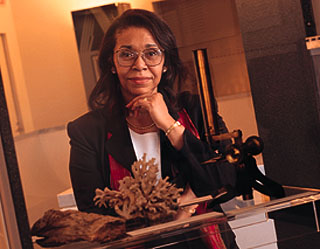

Scientist and educator Shirley Malcom, '67, the 1998 UW Alumna Summa Laude Dignata. Photo by Tyler Mallory.
By Jon Marmor
Shirley Mahaley Malcom knew she would have her hands full. But it didn't matter. She was on a mission. She wanted to be a doctor.
Overcoming obstacles was old hat for her. Growing up in the racist South in the 1950s and 1960s, she learned all about adversity. Her mom's church was bombed three times. And though she was the top student at her segregated, all-black high school, she knew going to college in the South was out of the question.
So she landed 3,000 miles from home at the predominantly white University of Washington, an affordable public institution with a medical school in a state that didn't have racist practices mandated by law.
Having family in the Seattle area (an aunt and an uncle) eased her transition, but it didn't prepare for her what lay ahead. Only a handful of black students attended the UW then. In her science classes, she was usually the only African American, many times the only woman, and always the only African American woman.
If that weren't enough, she suffered the indignity of failing two freshman chemistry quizzes. She was so discouraged, she sought help from her teaching assistant.
"I told him that I wasn't dumb, I was just having a really difficult time," says Malcom, who, for example, had never laid eyes on chemistry lab equipment before coming to the UW. "I told him I needed some guidance, but that I could do the work. I knew I had the ability."
The TA, a graduate student by the name of Ken Maloney, was himself African American, so he knew where Malcom was coming from. He lent an empathetic ear, and gave her the help she needed. The result? She aced her next quiz.
"If someone says diversity isn't important, don't believe it," Malcom says.
That one experience helped shape a career that has benefitted thousands upon thousands of people--not as a doctor, but first as a teacher and now as a national leader in making sure women and ethnic minorities don't have the same hardships in science she did.
Employing the skills she developed as a high-school and college teacher--using innovative approaches, getting people to work together and looking at the big picture--she took her lesson plan to the highest levels, teaching a nation that women and ethnic minorities were getting the short end of the stick when it came to science education, and then going about fixing things. At the American Association for the Advancement of Science and as a member of the National Science Board, she has brought science education to thousands and thousands of students who otherwise would not have had the opportunity. For her work, the University of Washington and the UW Alumni Association have bestowed upon her their highest honor: the 1998 Alumna Summa Laude Dignata Award.
"She is a pioneer who has not only has authored milestone reports but brought this issue to national attention," says Karl Pister, a former dean of engineering at Cal-Berkeley. "She is a wonderful role model, and the changes we are seeing are directly the result of her unwavering pursuit and dedication."
The UW Experience: Seeing the Potential
The Double Bind: Minority Women in Science
The UW's Alumna Summa Laude Dignata Award
Send a letter to the editor at columns@uw.edu.